First, the bad news for China’s economic miracle.
According to a quarterly report issued last month by China’s China Electricity Council (CEC), some parts of China will experience severe blackouts this summer as the result of an electricity shortage of 30-40 million kilowatt hours. The CEC warned, "The shortage will hit about 30 million kilowatt hours during summer peak days and may expand to 40 million kilowatt hours if heat waves persist," with China's more developed eastern and southern regions bearing the brunt of the shortages.
Aside from soaring demand is an unwillingness on the part of China to abandon its hundreds of coal-fired plants, which currently generate 389 billion kilowatt-hours, 70-80 percent of its domestic electricity. Of this 45 percent goes to the industrial sector, with the remainder used to generate electricity to produce more energy amid rising costs and decreased prices.
The shortfall has spurred Beijing’s efforts to locate any and all additional sources of power, especially those that might make use of the country’s vast coal reserves.
Accordingly, the good news is that on 10 May Shenhua Group Corp., China's largest coal producer, and General Electric Co. announced the opening of their joint venture coal gasification to advance "cleaner coal" technology solutions in the world’s largest country.
The 50-50 Shanghai-based joint venture was developed under a U.S.-China November 2009 framework agreement between the two companies as part of a broad agenda of Sino-U.S. clean energy cooperation. Under terms of the agreement Shenhua and GE will improve performance of commercial scale gasification and integrated gasification combined cycle (IGCC) solutions, which turn coal into a gas, removing impurities from the coal gas before it is ignited to generate power.
While fiscal arrangements of the joint venture were not disclosed, Paul Browning, chief of GE Energy's thermal products division, said GE put all of its $100 million gasification business in China into the new project. The joint venture will sell industrial gasification technology licenses in China, conduct research and development to improve cost and performance of commercial-scale gasification and IGCC operations and work to advance the distribution of commercial-scale IGCC.
With more than 50 licensed facilities in China, GE’s gasification technology is one of the most widely deployed in the industry, while Shenhua is one of the world’s largest coal and energy companies, with integrated coal production, power generation, railway, port and shipping infrastructure.
Shenhua Group deputy general manager Wang Xiaolin said, “Both GE and Shenhua have worked together for years in China on important projects, including the Shenhua Baotou coal-to-olefins facility, which uses GE’s gasification technology. The collaboration will create a leading gasification technology business in China with significant local presence, focus, resources and expertise,” while GE Energy China CEO Jack Wen added, “This is not a market access in exchange for technology deal. Instead, this will be a two-way technology win, with both GE and Shenhua benefiting from each other’s expertise.”
Putting the final seal of approval on the project GE Energy Thermal Products president and CEO Paul Browning concluded, “Coal plays an important role in the economies of both the U.S. and China, and gasification technology allows us to use this abundant and low-cost resource in a much cleaner way.
This joint venture is an evolution of the strong gasification business GE has in China today. Each business will contribute technology, operational and service expertise to create a comprehensive gasification and cleaner coal technology and service provider in China.”
The emphasis shift in coal power generation from thermal plants to utilizing IGCC technology is a key element in the Chinese leadership’s efforts to maintain its economic momentum by providing its vast industrial base uninterrupted power supplies.
China's National Institute for Clean-and-Low-Carbon Energy (NICE) President and CEO Mike Davis encapsulated Beijing’s thinking when he observed, "The path ahead for success is clear - China and the world must together invent new ways to extract, process and convert fossil fuels for use in energy production and utilization - in a way that is clean, safe, reliable and affordable."
What is singularly lacking in the GE, Shenhua Group and NICE pronouncements is any discussion of how Western technology and investment to improve China’s industrial base benefits Beijing’s trading partnerships, most of whom run massive trade deficits with China – most notably the U.S. In March Washington’s trade deficit with China rose to $21.7 billion, up from a February shortfall of $19.4 billion, with the government predicting that the trade discrepancy with China this year is on pace to exceed last year’s gap of $295.5 billion, which was an all-time high for any country.
So, aside from benefiting GE’s ‘bottom line,” where exactly is the benefit of this technology transfer to the United States? After all, China remains ostensibly a Communist country and as Vladimir Lenin once famously observed, “If you want to hang a capitalist, he’ll sell you the rope to do it.”
Questions about America’s ocean of red ink in its trade with China might make for fruitful political discussions in this presidential election year, but it seems unlikely to make the agenda.
By. John C.K. Daly of Oilprice.com
For the latest oil prices visit our homepage.


















